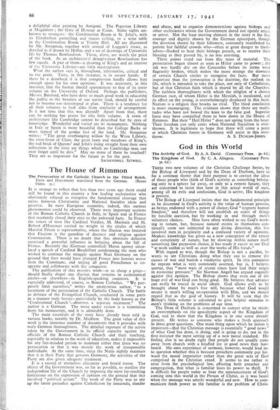The House of Rimmon
The Persecution of the Catholic Church in the Third Reich.
Facts and Documents translated from the German. (Burns Oates. 5s.) Facts and Documents translated from the German. (Burns Oates. 5s.) IT is strange to reflect that less than two years ago there could still be found in this country a few leading ecclesiastics who obstinately refused to recognise the fundamental cleavage that exists between Christianity and National Socialist ideas and practice. In most European countries, indeed, this curious phenomenon could be observed. There were important sections of the Roman Catholic Church in Italy, in Spain and in France that resolutely closed their eyes to the awkward facts. In France the voices of men like Cardinal Verdier, M. Maritain and M. Robert d'Harcourt carried no weight in the circles of which Marshal Petain is representative, where the illusion was fostered that Fascism is the guardian of decency and religion against Communism. There is no doubt that this obstinate delusion exercised a powerful influence in bringing about the fall of France. Recently the (German controlled) Havas agency circu- lated a speech of Cardinal Baudrillart condemning the men who wished to continue the struggle against Nazi Germany on the ground that they would have plunged France into horrors worse than the Commune, and urging all good Frenchmen to co- operate and collaborate with the conqueror.
The publication of this massive work—at so cheap a price— should finally dispel any illusion that remains in ecclesiastical circles—or elsewhere—in English-speaking countries. It is especially addressed, of course, to Roman Catholics. " We pur- posely limit ourselves," writes the anonymous author, " to a treatment of the persecution of the Catholic Church. The battle in defence of the Evangelical Church, conducted in some parts in a manner truly heroic—particularly by the body known as the `Confessional Church '--deserves a separate treatment." The author is a German. The wont under review is a translation from his manuscript, and it is admirably done.
The main essentials of the story have already been told in various books, notably by Dr. Micklem. The great value of this work is the immense number of documents that it provides with truly German thoroughness. The detailed exposure of the action taken by the Government in its official capacity against the officials of the Roman Catholic Church and their teaching, especially in relation to the work of education, makes it impossible for any fair-minded person to maintain either that there was no persecution or that it was merely the work of irresponsible individuals. At the same time, since the Nazis rightly maintain that it is their Party that governs Germany, the activities of the Party are also given adequate treatment.
It is a record of shameless chicanery and brutal terror. The object of the Government was, so far as possible, to sterilise the independent life of the Church by imposing the most far-reaching limitations on the expression of opinion on the ground that this involved " political action." The work of the Party was to stir up the latent prejudice against Catholicism by innuendo, slander and abuse, and to organise demonstrations against bishops and other ecclesiastics whom the Government dared not openly attack or arrest. Not the least moving element in the story is the fine courage and dignity shown by the German episcopate, though the devotion shown by their followers, constantly manifested by patient but faithful crowds who—often at great danger to them- selves—flocked to hear their bishops preach, or to receive their blessing as they passed by, is no less arresting.
Three points stand out from this mass of material. The persecution began almost as soon as Hitler came to power ; the ink was hardly dry on the Concordat before its terms were flagrantly broken, which makes the more strange the slowness of certain Church circles to recognise the facts. But more important than the persecution is the doctrine, the outlook on life, which is intended to take the place, not only of Catholicism, but of that Christian faith which is shared by all the Churches. The ruthless thoroughness with which the religion of a chosen German race, of whom Hitler is the Messiah, is inculcated, and its effect on the young, is overwhelmingly displayed in this book. Nazism is a religion that brooks no rival. The third conclusion is more encouraging. The evidence shows that there are multi- tudes who have not bowed the knee to the false god. Superior force may have compelled them to bow down in the House of Rimmon. But their " Heil Hitler " does not spring from the heart. Their freedom can only come when National Socialism is over- thrown. It is legitimate to hope that there will come a point at which Christian forces in Germany will assist in this over-






























 Previous page
Previous page